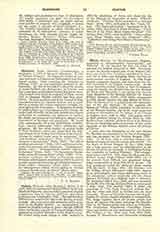

Clichtove, Josse (Jonocus CLICHTOVAEUS), a theologian, b. 1472 at Nieuport (Flanders); d. 1543 at Chartres (France). He began his studies at Louvain and went to Paris for his philosophical and theological studies. After receiving the doctorate in theology (1506) he was appointed professor at the Sorbonne. In 1515 he was asked to direct the studies of Louis Guillard, the Bishop-elect of Tournai, and four years later accompanied him to this latter place. After a short stay there, he returned to Paris, and in 1527 to Chartres, whither Guillard had been transferred. He took an active part in the Council of Sens, convoked at Paris by Cardinal Duprat, and he gathered in a volume the various arguments brought forward against the Protestants. A champion of reform in philosophical and theological studies during the earlier part of his life, he devoted himself later almost exclusively to combating the doctrines of Luther. His works are numerous and belong to almost every department of theology and philosophy. He began with commentaries on many Aristotelean treatises: logic, natural philosophy, ethics, arithmetic, and geometry. He also wrote studies on several books of Holy Scripture, edited and commented the writings of some of the Fathers and Doctors of the Church. Among his original works must be mentioned “De vera nobilitate opusculum” (Paris, 1512); “Elucidatorium ecclesiasticum” (Paris, 1516); “De vita et moribus sacerdotum” (Paris, 1519), and several other works of instruction and edification; “Antilutherus” (Paris, 1524); “Propugnaculum ecclesim adversus Lutheranos” (Paris, 1526); “De Sacramento Eucharistiae contra Ecolampadium” (Paris, 1526); “Compendium veritatum ad fidem pertinentium contra erroneas Lutheranorum assertiones ex dictis et actis in concilio provinciali Senonensi apud Parisios celebrato” (Paris, 1529); “Sermones” (Paris, 1534); “Convulsio calumniarum Ulrichi Veleni quibus S. Petrum nunquam Romae fuisse cavillatur” (Paris, 1535).
C. A. DUBRAY

